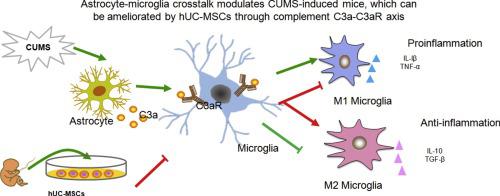Brain Research Bulletin ( IF 3.5 ) Pub Date : 2020-07-15 , DOI: 10.1016/j.brainresbull.2020.07.004 Jing Li 1 , Hualong Wang 1 , Chongbo Du 1 , Xiaojing Jin 1 , Yuan Geng 1 , Bing Han 1 , Qinying Ma 1 , Quanhai Li 2 , Qian Wang 3 , Yidi Guo 3 , Mingwei Wang 1 , Baoyong Yan 4

|
Background
Major depressive disorder (MDD) has been shown to be related to immune inflammation and the complement system. Previous studies have suggested that human umbilical cord mesenchymal stem cells (hUC-MSCs) play an important role in inflammatory diseases.
Methods
hUC-MSCs were administered into chronic unpredictable mild stress model (CUMS) mice through the tail vein once a week for 4 weeks. After the administration of hUC-MSCs, the depression-like and anxiety-like phenotypes, neuronal histopathology, synaptic-related protein expression and inflammatory index of the mice were assessed. Microglial M1/M2 polarization and the expression of C3a in astrocytes and C3aR in microglia was detected by immunofluorescence co-localization. Then, CUMS mice were injected with a C3aR antagonist, and the expression of C3a and C3aR and microglial polarization were observed.
Results
Based on the sucrose preference and tail suspension tests, hUC-MSCs ameliorated the depression-like behaviors of CUMS mice. Additionally, the anxiety-like behaviors of CUMS mice in the open-field and plus-maze tests were improved after the administration of hUC-MSCs. hUC-MSCs altered microglia polarization by alleviating complement C3a-C3aR signaling activation, which decreased pro-inflammatory factor levels and increased anti-inflammatory factor levels, alleviating neuronal damage and synaptic deficits.
Conclusion
hUC-MSCs have therapeutic effects on anxiety-like and depressive-like phenotypes caused by CUMS. They can alter the polarization of microglia by inhibiting C3a-C3aR signaling to reduce neuroinflammation.
中文翻译:

hUC-MSCs 通过在星形胶质细胞-小胶质细胞串扰期间调节补体 C3 信号介导的小胶质细胞极化来改善 CUMS 诱导的抑郁症。
背景
重度抑郁症 (MDD) 已被证明与免疫炎症和补体系统有关。先前的研究表明,人脐带间充质干细胞 (hUC-MSCs) 在炎症性疾病中发挥重要作用。
方法
hUC-MSCs 每周一次通过尾静脉注射到慢性不可预测轻度应激模型 (CUMS) 小鼠中,持续 4 周。hUC-MSCs给药后,评估小鼠的抑郁样和焦虑样表型、神经元组织病理学、突触相关蛋白表达和炎症指数。通过免疫荧光共定位检测小胶质细胞 M1/M2 极化和星形胶质细胞中 C3a 和小胶质细胞中 C3aR 的表达。然后,给CUMS小鼠注射C3aR拮抗剂,观察C3a和C3aR的表达及小胶质细胞极化。
结果
基于蔗糖偏好和悬尾试验,hUC-MSCs 改善了 CUMS 小鼠的抑郁样行为。此外,在施用 hUC-MSCs 后,CUMS 小鼠在开放场和十字迷宫试验中的焦虑样行为得到改善。hUC-MSCs 通过减轻补体 C3a-C3aR 信号激活来改变小胶质细胞极化,从而降低促炎因子水平和增加抗炎因子水平,减轻神经元损伤和突触缺陷。
结论
hUC-MSCs 对 CUMS 引起的焦虑样和抑郁样表型具有治疗作用。它们可以通过抑制 C3a-C3aR 信号传导来减少神经炎症,从而改变小胶质细胞的极化。































 京公网安备 11010802027423号
京公网安备 11010802027423号